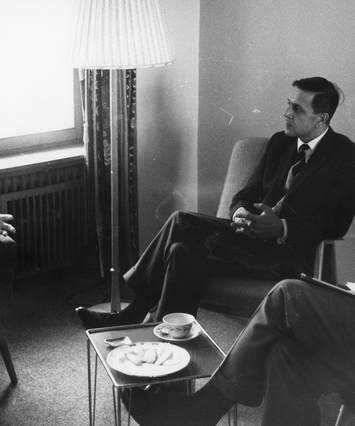Paul-Émile Dentan 17.8.1926- 3.10.2015
An ardent patriot. Paul-Émile Dentan may not be known to the younger generations working today in the spirit of Initiatives of Change. But the achievements of this Genevan who has just left us at the age of 89 are not necessarily known even to those who were among his closest friends, as is my case. For alongside his deep faith and his tenacity in action, modesty was what characterized him.
I did not know or I did not remember that he had, for example, ardently supported a prime minister of Sri Lanka who hoped to introduce democracy in his country. Unfortunately the assassination of this leader very soon afterwards destroyed this effort. Dentan was also very close to several African leaders to support them as their countries gained independence.
His father, a pastor from Lutry, and his Alsatian mother moved to Geneva in 1927, and it was there that their only son grew up. As a child, Paul-Émile was captivated by the construction of the Palais des Nations, without suspecting the role that this institution would play in his life.
I knew him from the beginning of high school when we were in the same class. But it is especially from our university studies that a solid friendship was welded between us when we were led, thanks to the contacts that we had established in the trade union milieu, to contribute to the resolution of a serious and long conflict in the construction sector and to the signature of a collective agreement that ensured peace in this industry for a whole decade. In this way, we became apprentice mediators in the spirit of Moral Rearmament, which had captured our interest and our desire to participate in the reconciliation of Europe after the war.
During his recruit school, Dentan was marked by a dramatic experience: his school had to spend the night in a fort for an early morning shooting exercise. His colonel finally decides to postpone the project. During the night, the fort's ammunition depot was blown up, killing all the Italian workers who were working on a new tunnel. Of this experience, Paul-Émile wrote: "This catastrophe had an unexpected effect on me. My conscience told me that if I had my life saved, it was because God wanted it and that he had a plan for me."& It was this conviction that marked his entire life.
In 1946, we both participated in the meeting in Interlaken where it was decided to buy the Caux-Palace to make it the international center of Moral Rearmament. After completing his studies in political science, he became involved with the movement full-time in the United States, Asia and Africa, where he spent ten years. In Paris, he orchestrated the dubbing of the film "Liberté" and promoted it in four African countries in the service of dialogue and peace. Later, the passion we both had for writing led us to create the magazine "Changer" which helped strengthen the expression of Moral Re-Armament ideas in the French-speaking world.
He then embarked on professional journalism as a columnist for the United Nations for the "Journal de Genève" and the "Nouvelliste du Valais". An ardent patriot, Paul-Émile Dentan paid a vibrant tribute to the Swiss Protestants who, in 1942, took all kinds of steps to oppose the closing of the borders ordered by Federal Councillor von Steiger, an order that was to lead to the refoulement and death of many refugees, in a book entitled "Impossible de se taire". These brave Swiss were inspired by the conviction that Switzerland's existence was based more on a spiritual pact than on a principle of neutrality. This conviction is still valid today. Afterwards, politics caught up with him and Paul-Émile was called upon to become secretary general of the Geneva liberal party and a municipal councilor.
At the same time, he was active in the social field and assumed the presidency of the Petit-Saconnex parish council and the retirement home in the same place. In recent years, he was forced to move into this institution where his wife still resides, unfortunately in a state of health that is a severe ordeal for his family and those close to this close-knit couple.
Französisch


